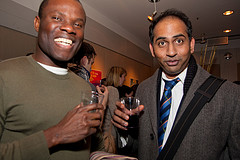What do Jack White, The Edge and Jimmy Page have in common? A borderline psychotic obsession with their guitars, naturally. On Thursday, July 30, Young Friends of Film presents a preview screening of It Might Get Loud, a documentary examination of these legendary axemen from Inconvenient Truth director David Guggenheim.

Over in the current issue of Film Comment, Chris Chang (who’s been rumored to rock himself) has a great Hegelian analysis of the inherent drama of bringing together three such charismatic personalities:
“Page nicely fits the bill of rock ‘n’ roll progenitor, at the very least nominally, having, among other things, co-authored the 1971 Zeppelin staple “Rock and Roll.” Contra Page’s blistering finger virtuosity, we have The Edge’s militantly reductive technique, a method that favors open-stringed, ringing chords over aggressive solo noodling—albeit after said chords have passed through towering racks of effect processors. Jack White is a bit too young, and has come late to the “roots” variety of rock he emulates, so he must necessarily be categorized, at least for now, as postmodern anomaly. But his generation will always gleefully admit to the vampiric joys of pastiche. On the way to the film’s on-screen summit, he lets slip an ulterior motive: “stealing” the chops of his guitar elders. Given the same opportunity, who wouldn’t?”
Come for the potential chop-stealing opportunities, but stay for the director Q&A and afterparty. These Young Friends of Film events are always packed with great conversation, free drinks, and interesting people. And if you want to feel like a VIP all year, you might consider joining Young Friends of Film. For just $250, you’re on the A-List for parties and events designed especially for younger film enthusiasts at the Film Society of Lincoln Center. You can let your Netflix queue languish while you sit in on engaging conversation with top actors about their craft, meet influential directors, and hob-nob with other discriminating film lovers all year long. What are you waiting for? Join now.
We’d also like to give a shout-out to our media partner KEXP. Maybe you’re like me, a long-time listener to KEXP’s excellent internet radio stream via iTunes. Turns out the pioneering Seattle station was so popular in New York via the internet that in 2008, the KEXP folks joined with Radio New York to launch a Gotham-centric offshoot called Radio Liberation, 91.5 FM on your radio dial. Same adventurous musical mix, but with 75% less rain. Seriously, tune in, they rock.
Don’t forget to join us on Thursday July 30th for a rocking screening and party!

















Photos from Young Friends of Film Presents: It Might Get Loud
August 3, 2009All photos by Godlis
Our most recent Young Friends of Film event–It Might Get Loud–was a smash success, with a packed house, director Q&A and afterparty. Don’t miss out next time! Join YFF now and you’ll be on the A-list for a year’s worth of events designed especially for younger film-lovers.
Thanks again to our friends at KEXP for taking part in the event. New Yorkers, you don’t have to stop rocking–tune into 91.5 FM for great music, local events and much more from KEXP Radio New York.
Categories: Film Comment, inside the film society, just for fun, Young Friends of Film
Tags: chris chang, davis guggenheim, elisabeth shue, Film Comment, godlis, It Might Get Loud, KEXP, yff, Young Friends of Film
Comments: Be the first to comment